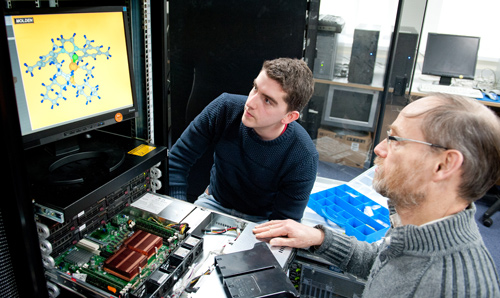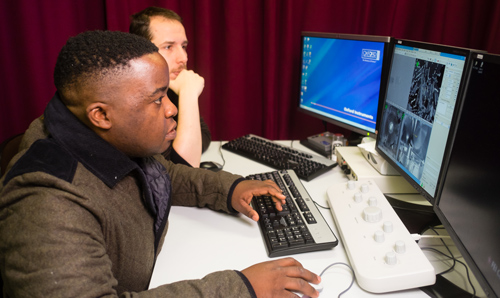
Study
Our four-year doctoral training programme, leading to the award of a PhD in Nanoscience.
Recruitment
The final cohort for this programme has been recruited, explore our new 2D of Tomorrow CDT for exciting opportunities.
We train the next generation of scientists who will be able to realise the huge potential of graphene and related 2D materials and drive innovation in the UK, Europe and beyond.
Graphene has been dubbed a miracle material due to the unique combination of superior electronic, mechanical, optical, chemical and biocompatible properties suitable for a large number of applications.
The potential of other 2D materials (e.g. boron nitride, transition metal and gallium dichalcogenides) has become clear more recently and is now leading to the development of the so-called ‘materials on demand’, i.e. materials with desired properties, not readily available in nature.

The taught section of the scheme is an extremely useful opportunity to learn about aspects of nanoscience and nanotechnology that I had not yet gained familiarity.
Harry Waring / CDT student based in the Department of Computer Science
Recent research
There has been an explosion of research and development activity in graphene and related 2D materials all over the world which has led to companies such as inov-8 successfully incorporating graphene into an award winning commercially available product.

The CDT promotes group working throughout the whole programme and it’s enormously beneficial getting to know your fellow students.
Robert McMaster / CDT student based in the Department of Materials
The University of Manchester is the birthplace of graphene research and has continued to lead the field in a huge research expansion from the fundamental physics of graphene and related 2D materials to chemistry, engineering, characterisation and bioapplications.
Lancaster University is an important partner, providing complementary expertise in theoretical modelling and niche experimental techniques.
We provide a wide-ranging interdisciplinary PhD programme that develops postgraduate researchers into thinking and working collaboratively across traditional disciplinary boundaries.
In support of this an important feature of the Graphene NOWNANO CDT is its close engagement with a number of partners, academic and industrial, including the National Graphene Institute.
Programme structure
Year 1: September - March
Taught component of the programme
Four custom developed lecture courses cover different aspects of the science and technology of nanomaterials and their applications. Two enquiry-based learning (EBL) projects are completed and two extended lab projects. EBL and lab projects are done in small groups comprising students with different undergraduate backgrounds, which facilitates peer-to-peer learning and provides you with experience of working as part of a research team.
During this time you will decide upon a project which you will undertake for the rest of the programme. See examples of current projects.
Year 1 April - end of Year 4
Research component
For the remaining on the programme you will work on a research project with your supervisor, while partaking in additional CDT training.



